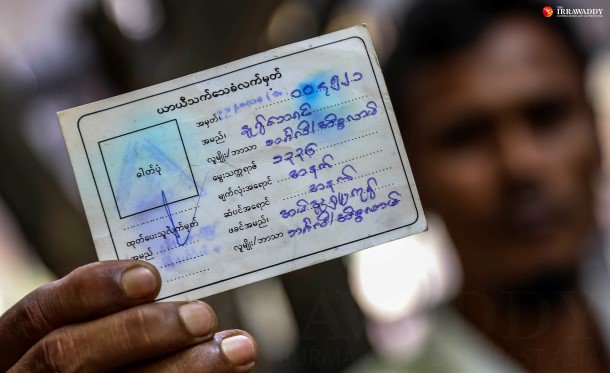RANGOON — Stateless Rohingya Muslims in Arakan State were dealt the latest blow to their prospects for obtaining recognition as one of Burma’s ethnic minorities when the government announced last month that their temporary identity cards would be rescinded.
The revocation has prompted discussion on topics ranging from national sovereignty to human rights, but the decision’s impact may most immediately be felt in a general election later this year and could presage the rise of ethnic Arakanese voices in the regional government.
The President’s Office on Feb. 11 said the so-called “white cards” granting temporary identity papers would expire on March 31, and gave holders of the IDs until May 31 to turn them over to the government.
The announcement leaves the roughly 1.5 million white card holders with a choice: Give back their IDs with little assurance of receiving an alternative identity document, or defy the government order.
For decades subject to a variety of discriminatory policies, many Rohingya are expected to do the latter, fearing that a total lack of identification will give the government cause to push them into Bangladesh. This western neighbor is where popular opinion says they belong despite many Rohingya tracing generations of lineage in Burma.
Of the country’s white card holders, the Rohingya Muslim population constitutes the largest group.
Aung Win, a Rohingya rights activist based in the Arakan State capital Sittwe, said the government’s failure to articulate of viable future for the group is fueling apprehension.
“It will not work out, their plan, because our people find that there is no transparency from the government. We have questions about what type of card they will give in lieu after we give back our cards. Are they only going to give a small white piece of paper again, which has no value?
“Many of our people are saying they will not give it back. It is hard to think about what will happen next. We heard that they will implement a system based on Burma’s 1982 Citizenship Law. This will make it even more difficult [to obtain a replacement for the revoked white cards],” he said, adding that many Rohingya lacked sufficient proof of their origins in Burma to meet government standards on qualifying for citizenship.
This is likely to be particularly difficult for some 140,000 Rohingya currently living in displacement camps in Arakan State, who were forced to flee their homes, many of which were burned to the ground, in violence between Buddhists and Muslims in 2012.

Burma’s 1982 Citizenship Law designates three categories of citizens: full citizens; associate citizens; and naturalized citizens. Color-coded Citizenship Scrutiny Cards are issued according to citizenship status—pink, blue and green, respectively.
A national verification pilot project was first implemented at camps for displaced persons in Myebon, Arakan State, with 209 people receiving citizenship in the initial screening. The project drew the ire of many Arakanese community leaders, however, and the plan was suspended indefinitely in October.
The fate of the pilot project has led to a logical question: Why would any larger scale effort to screen applicants for citizenship meet any other end than that of the Myebon pilot? The support—or lack thereof—of ethnic Arakanese Buddhists has proven a powerful predictor of policy direction in the state.
A Political Game?
That Arakanese influence could increase, too, as a result of the white card revocation.
The government set a precedent in 2010, when it allowed white card holders to vote in the general election that year. As a result, Arakanese politicians were unable to win regional parliamentary seats in some state townships such as Buthidaung and Maungdaw, where the majority of the population is Muslim and tends to view Arakanese parties antagonistically.
The Constitution’s Article 391(a) grants suffrage to the three types of citizens recognized in the Citizenship Law, but makes no specific reference to holders of temporary identity cards.
Burma’s Constitutional Tribunal weighed in on the matter last month, finding white card holder suffrage unconstitutional less than a week after the President’s Office announced the cards’ revocation.
Arakanese critics have long accused the ruling Union Solidarity and Development Party (USDP) of issuing the white cards to win votes, and the constitutional ruling came after a group of Arakanese parliamentarians asked the court to rule on the matter.
Pe Than, a lawmaker from the Arakan National Party (ANP), said the rescinding of temporary identity cards would mean an end to “white card politics.”
“First of all, we have found that by giving white card holders the vote, this relates to politics. But they [the government] found that a lot of people in the country are against their policy and even the high court pointed out that this violates the Constitution, so they can no longer play their white card politics.”
With white card holders removed from the voting rolls, Arakanese political parties have high hopes for the outcome of this year’s election, which they expect will see their members take a number of seats in both state and Union legislatures.
The ethnic Bamar-dominated central government is wary of minority influence in state parliaments, where constituencies are heavily populated by ethnic minority voters.
The Arakan State parliament consists of 34 elected members and 12 military-appointed representatives. Arakanese lawmakers hope to win a net six seats in 2015, which would give them a majority of the parliament’s 46 representatives.
Arakanese politicians won 18 seats during the 2010 election. The USDP won 13 seats, and two smaller parties—the National Unity Party and the Asho Chin National Party—both won one seat. But the Burma Army’s 13 representatives have allowed a united USDP-military front to control the legislature.
“They would not have power in parliament, even by working all together, if we win six more representatives in this election. We will have the influence and power in parliament this time,” said Pe Than, pointing to the ability of an Arakanese-majority legislature to dictate the legislature’s agenda and block presidential appointments to the powerful chief minister post as two ways in which the ethnic group would wield the influence that it seeks.

















